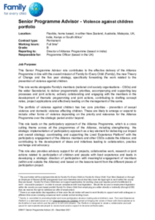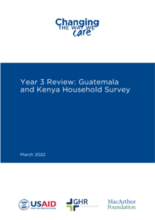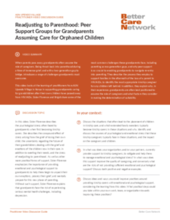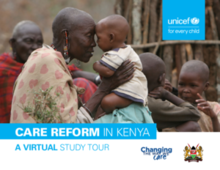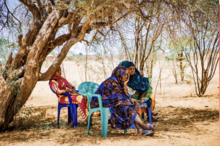This country page features an interactive, icon-based data dashboard providing a national-level overview of the status of children’s care and care reform efforts (a “Country Care Snapshot”), along with a list of resources and organizations in the country.
demographic_data
childrens_living_arrangement
children_living_without_bio
adoption
social_work_force
key_stakeholders
Key Stakeholders
Add New DataOther Relevant Reforms
Add New Datadrivers_of_institutionalisation
Drivers of Institutionaliziation
Add New Datakey_research_and_information
Key Data Sources
Add New DataChildren's Act, 2022 (Kenya)
Prevalence and number of children living in institutional care: global, regional, and country estimates
Social Protection and Disability in Kenya
Kenya Social Protection Sector Review
Country Care Review: Kenya
Child Developmental Disabilities, Caregivers’ Role in Kenya and Its Implications on Global Migration
Research findings on Alternative care system in Kenya for children without parental care
Charitable Children Institutions in Kenya: Factors Influencing Institutionalization of Children
Acknowledgements
Data for this country care snapshot was contributed by consultants with Maestral International.
Displaying 151 - 160 of 447
The war in Ukraine is set to tip more families in the Horn of Africa over the edge. The region has become increasingly dependent on imported grains from Russia and Ukraine. Ethiopia, Kenya and Somalia import 67 percent, 89 percent and 92 percent of their wheat respectively from the two countries. Russia and Ukraine also account for 53 percent of the global trade of sunflower oil and seed. However, supply lines are blocked and, in areas of Ukraine, agricultural production is in danger. The prices of cooking oil, bread and wheat flour are already reaching new records in local markets in the Horn of Africa. A dire nutrition crisis is expected to escalate.
Salary:
GBP £50-55,000 equivalent - fixed in local currency. Salary will be determined based on experience and adjusted to the local market rate.
In 2021 Changing the Way We Care (CTWWC) completed a household survey of children and caregivers, in demonstration countries Kenya and Guatemala, to understand their experience of CTWWC services, the protective factors in their families, and the status of child well-being. Part of CTWWC’s year-three evaluation, these resulting four reports are meant to help CTWWC partners, and other care reform actors within Guatemala and Kenya, better understand CTWWC’s impact through the end of the initiative’s third year.
This report contains the complete Kenya and Guatemala Household Survey results.
This video summary accompanies the Readjusting to Parenthood: Peer Support Groups for Grandparents Assuming Care for Orphaned Children (Upendo Village, Kenya) practitioner learning video which is part of the Kenya Practitioner Learning Video Series.
यस अध्ययनले सातवटा केन्द्रित देशहरूमा २१ अर्ध-संरचित अन्तर्वार्ताहरू समावेश गरी गुणस्तरीय अनुसन्धान अध्ययन सञ्चालन गरेर निजी रूपमा सञ्चालित र वित्त पोषित आवासीय हेरचाह संस्थाहरूको सानो संख्यामा COVID-19 को प्रभावको अन्वेषण गर्दछ।
The UNICEF-Changing the Way We Care Regional Learning Platform for Eastern and Southern Africa held its first webinar of the year on Child Protection System Strengthening and Care Reform.
This webinar will provide an overview of child protection system strengthening and the linkages between this approach and care reform. It will outline the ten components of a system strengthening approach to care reform and provide three examples of putting these components into practice. The examples will be presented by UNICEF country office staff, government agencies and their partners. They will focus on the development of the national care form strategy in Kenya, workforce strengthening for care reform in Rwanda, and care system assessment in Uganda.
This Changing the Way We Care virtual study tour aims to provide an overview of care reform in Kenya from the comfort of your own home. Care reform relates to the care of children. It refers to efforts to improve the legal and policy frameworks, structures, services, supports and resources that determine and deliver alternative care, prevent family separation and support families to care for children well.
This framework was developed to guide the process of taking in vulnerable children by families, whether they are related to the specific families or not and bringing them up the same way they bring up their biological children.

